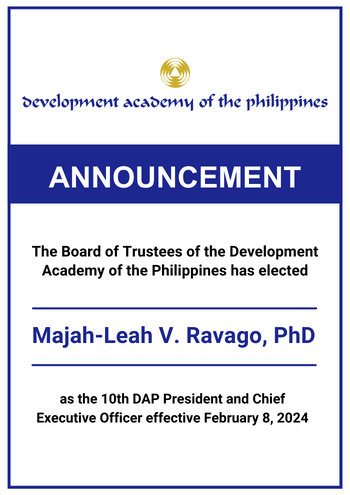The 91∆ř”—, through its Center for Governance, recently launched the inaugural session of its Policy Research Online Lectures and Discussion Series. Titled ‘Developing a Policy Research Agenda in Government: Acknowledging Its Need and Importance’, the session drew in over 250 participants from a diverse array of government agencies, government-owned and controlled corporations, local government units, academic institutions, and other sectors.

The presenters, reactors, and former 91∆ř”—President Dr. Eduardo Gonzalez, who moderated the online discussion
Moderated by former 91∆ř”—President Dr. Eduardo Gonzalez, the session provided invaluable insights into various issues surrounding policy research. Distinguished speakers including Gilbert Lumantao, Director of DAP’s CFG-Policy Research Office; Merwin Salazar, Executive Director of the Senate Economic Planning Office; Novel Bangsal, Executive Director of the Congressional Policy and Budget Research Development; and Dr. Geraldo Petilla, Chief Administrative Officer of the National Research Council of the Philippines – Finance and Administrative Division, illuminated the significance of policy research in governance and national development.
Key topics explored during the session included the role of political will in policy research processes, the importance of establishing clear mandates to avoid redundancy in research outputs, and the relevance of scientific research and technological advancements in shaping the government’s policy research agenda.

Salazar emphasized how policy research shapes effective governance and national development by influencing policymakers’ understanding of issues and the implications of policy options. Bangsal highlighted increasing risks to shared prosperity, such as unsustainable economic growth, unemployment and underemployment, and increasing social inequality. He stressed the need for a calibrated approach to collaboration between the national and local governments.
Dr. Petilla elaborated on the whole-of-government and evidence-based transdisciplinary approach guiding the NRCP‚Äôs policy research priorities, emphasizing the importance of dialogue between researchers, legislators, and local chief executives. Lumantao discussed DAP’s role as a government think tank, providing research-driven technical assistance and training to aid public managers and organizations in developing and evaluating sound public policies¬† and establishing systems integrity.
Dr. Jalton Taguibao, Associate Professor at the University of the Philippines Diliman-Department of Political Science, and Maxine Tanya Hamada, Advocacy Campaign for Tobacco-Free Kids country coordinator, offered perspectives from academia and civil society. Dr. Taguibao emphasized the ubiquitous nature of policy research in the policy-making process, while Ms. Hamada stressed the importance of technically sound and politically feasible research.
In his concluding remarks, Dr. Gonzalez underscored the importance of policy research, stating, ‘Policy research needs resuscitation not because smart politicians interfere, but simply because it takes hard work to design a system that both allows efficient collective decisions and protects the legitimate interests of various constituents, including the poor and the marginalized.’
The discussion aimed to initiate collaborative efforts in shaping a policy research agenda, contributing to evidence-based policymaking in government. The full video coverage of the event is available at the .


